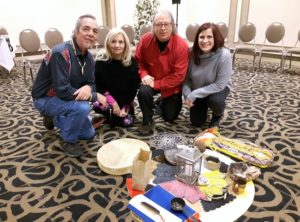Comfort in the community: Shkawbewiss conference helps the helpers

By Laura E. Young
SUDBURY – In a circle that was ever widening, Will Morin, Indigenous Studies professor at the University of Sudbury, spoke to change he has seen in the last 20 years in Sudbury.
The Indigenous Studies professor was co-hosting the Shkawbewiss Helpers Conference with Jim Eshkawkogan, Indigenous services manager at Better Beginnings Better Futures.
“The more we are included, the more our stories are heard and the more our people are participating in the process, the more our younger ones coming up will see that’s normal,” says Morin. “Anytime there is a chance to continue that growth, to inspire more awareness – it does not diminish that work. It does not diminish the work that our allies are helping to implement.”
The Shkawbewiss Conference was the first of its kind as a networking event where Elders, helpers and other agency workers came together to share ways and teachings in relation to the cultural needs of the community.
The conference was limited to 50 service providers from across Sudbury, including health care, the police, and the schools. Held on Dec. 12, conference goers spent their time sharing in a circle, and discussing various topics from their work to creating healthy communities that will help foster pride in Indigenous community members.
The conference was a first for Better Beginnings Better Futures. Founded in 1989, Better Beginnings works towards positive, child-centred community development in neighbourhoods deemed at-risk, including Sudbury’s Donovan and Flour Mill communities.
Eshkawkogan said that the time was right for people to come together to share the work they do.
“We’re [getting] a nice broad range of what that’s all about. If you’re working with city services, what we want them to know is, yes, there are families here; these are the needs they have. Sometimes there are barriers. These are the barriers but we address those together through identifying them.”
Eshkawkogan also felt it was important for the different agencies to gather to discuss what supports they need while also seeing how they are resources from which other community helpers can learn. This is especially key as initiatives rooted in the Truth and Reconciliation Commission’s calls to action are launched in the school boards.
“The focus is on family and children. There is a big focus on Indigenous education. We want to make sure the right message is going out, that it’s inclusive, connected. The biggest thing is to have the understanding that Indigenous and mainstream are in this together. “
Eshkawkogan hoped the conference showed a more concrete way of addressing the needs of Indigenous culture.
“I’d like them to know it’s not mystical. What are the foundations of that culture? There’s the language that’s in there and the connection with the territory I’m in and all the things that go into it,” he said. “We have this thing how you carry it. But if you’re in a classroom, what’s the starting point to bring up the culture?”
The cultural needs of the community include giving families the help they need to find their identity and their language, he said.
“Often, we have to do that in a way where they can have some pride in it, if I can use that word.”
For Morin, non-Indigenous people have also been deprived of the culture of the community.
“If there is a challenge of anything is we need to be broadening our methods of healing, opening our circles to be more inclusive. Indigenous peoples need to heal as well. All cultures equally have a healing to do. If we don’t do it together, then we can’t move forward together.”
Among its many projects, the Indigenous Led Program at Better Beginnings visits all 32 Early-On program sites, conducting various programming including Indigenous cultural outreach.

